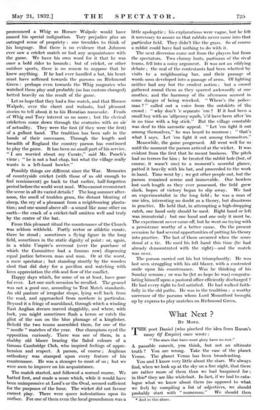What Next ?
BY MOTH.
THE poet Daniel (who pinched the idea from Bacon's essay Of Empire) once wrote : " The stars that have most glory have no rest."
A passable conceit, you think, but not an ultimate truth ? You are wrong. Take the case of the planet Venus. The planet Venus has been broadcasting.
You and I know very little about the stars. We always find, when we look up at the sky on a fine night, that there are rather more of them than we had bargained for : in this they are like whitebait. In fact, if we had to cata- logue what we know about them (as opposed to what we feel) by compiling a list of adjectives, we should probably start with " numerous." We should then * And in this alone.
put down " very small " ; but after a bit we should scratch out " very," and eventually " small " as well, in case people should find out about. our not having read Sir James Jeans. -After that we should be stuck. Our powers of accurate, scientific observation would be exhausted. We should be tempted to abandon a strictly descriptive for a suggestive method. Adjectives like " lovely," " inscrutable," " aloof "—adjectives which throw more light on Man than on his Universe—would be suppressed with the greatest difficulty. Then, just when it seemed that our analysis of fundamentals must end, as it began, with " numerous," it would occur to us that the stars—unlike, for instance, the sea— never make any noise ; and we should put down " silent."
Here, it appears, we should be making a bad mistake. The stars are not silent. The planet Venus, as I say, has been broadcasting. The other day, with all America listening in, she emitted, via Washington Square, " a high sustained note like a violin note." As to how it was done, I am sure you will understand what I mean when I say that it was simply a matter of photo-electric cells and telescopes. Child's play. The important thing is that here you have a planet entering the field of public entertainment, making high-sustained notes into the microphone like any hare-lipped warbler of folk songs, monopolizing the attention of the public as ruthlessly as any adenoidal analyst of Educational Reforms in Bosnia. It is a startling and, to my mind,. a regrettable development. In the first place, it will involve all the heavenly bodies in a considerable loss of prestige. The qualities which we look for in a star—the qualities which automatically evoke adjectives like " lovely," " inscru- table," and " aloof "—will not be enhanced by hearing it make monotonous noises on the wireless ; just as the qualities we look for in a bishop would not be enhanCed by seeing him give an uneven performance in musical comedy. In the second place, it is clearly wrong that the bread should be taken out of the mouths of professional wireless entertainers by extra-terrestrial amateurs.
This last objection is a particularly cogent one. It is all very well to say that the competition from the stars cannot be so very formidable, because the stars are only audible when they are visible, and can therefore only perform at night, and in fine weather. The stars are not the only recruits to the microphone. On the evening on which the planet Venus made her debut, (The Times says) " the sounds of objects were also broadcast. The American flag made a noise like an orchestra without a conductor, and a cigar made a hoarse growling sound."
Now this is serious. If people are so easily amused that they are amused by this sort of thing, there is no telling where it will end. There are, of course, some objects which it would be genuinely interesting and instructive to listen to. The shrill, elusive titter of a collar-stud, for instance : the dull, mechanical booming sound given out by a copy of the Spectator: the clear, bell-like note of Stilton cheese : the Italian flag, which would presumably make a noise like a conductor without an orchestra : the savage roar of a pin. To such things as these, our curiosity would give a ready hearing.
At first the public would be all agog to hear what sounds were made by objects with which it was familiar. People would tune in eagerly to listen to a fruit salad, or an occasional table, or a bowler hat. But the number of such everyday objects, though large, is not unlimited. It would soon be exhausted, leaving a few Old Favourites firmly established in the pUblic'S. approval. A new demand would spring up—a lust for novelty,-an Unhealthy craving for the noises made by remote,* improbable
things. Those responsible for the wireless programmes would yield to it, and presently we should be hearing sounds recommended only by the fantastic nature of their origin. . .
" Good evening, everybody. You are now going to hear what sort of noise it is that a celandine makes after it has been pressed between the pages of the London Telephone Directory... .
" Hallo, everybody. The sound you have just heard was emitted by a mole-skin waistcoat three days after it had been fired out of a cannon. The next item on the programme will be a pair of 18th century riding-boots full of Cape gooseberries. . . ."- But really, as I said before, there is no telling where it will end.





































 Previous page
Previous page